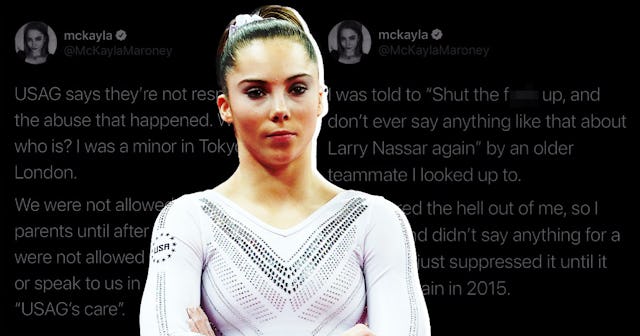Former Gymnast McKayla Maroney Detailed Horrifying Olympics Abuse

Former Olympic gymnast McKayla Maroney opened up about the horrific abuse she endured during her time competing for Team USA, and it’s brutal to read
Content warning: This article discusses sexual abuse of a minor.
In the immediate rise of the #MeToo movement, several athletes came forward to share that they’d been sexually abused by Larry Nassar, the doctor for the U.S. women’s national gymnastics team for 18 years. Nassar reportedly abused at least 265 girls and young women in that time, including gymnasts Simone Biles, Aly Raisman, Gabby Douglas, and McKayla Maroney before being sentenced to 60 years in federal prison in 2017. That same year, Maroney filed a lawsuit against USA Gymnastics (USAG), the U.S. Olympic Committee (USOC), Michigan State University, and Nassar for forcing her into silence by way of a non-disclosure agreement (NDA), paying her a reported $1.25 million to remain quiet.
Now retired from professional gymnastics, the Olympic gold medalist is opening up more specifically about the abuse she experienced on social media, sharing the ways in which USA Gymnastics, the national governing body of gymnastics in America, failed to protect her and other young athletes and seemingly prevented her parents from being around to know what was going on behind the scenes.
Amidst the 2020 Olympic Games in Tokyo, the 25-year-old shared an Instagram post asking Olympic fans to “please cut the athletes some slack, and send them some love instead of criticism.” She shared a series of tweets detailing her experiences, writing, “These tweets can be a little rough to read, and I apologize for that. I never wanted these things to happen in the first place, let alone have to speak it to the world.”
Over on Twitter, she responded to a fellow gymnast who said “gymnastics broke me a lot more mentally than it did physically (which was also a lot),” writing, “Me too girl, #metoo. It took me till now to be able to find myself, my health, and my voice again.. and it’s been 9 years since my Olympics. You’re not alone. I speak with many gymnasts and they all feel the same.”
In a subsequent tweet, she alleged that the International Gymnastics Federation (FIG), the global governing body of competitive gymnastics “100% prioritize TV over athletes every time — and it hasn’t even worked, views are down,” adding that the organization’s “insanely unsafe regulations definitely pushed me to retire. I have so many complaints.”
In response to a follower who asked if “parents don’t protect [their] kids in gymnastics?” Maroney shared that she was not only separated from her parents during competitions, but that her mom had to send care packages with food to her hotel because she was “starving.”
Maroney added that when she did speak up about the abuse she faced, the organizations began “pointing fingers,” seemingly to absolve themselves from blame.
Alleging that she was under the care of USAG during international competitions, she added that the USOC — the governing body for U.S. athletes — “was so hands off I didn’t even know I was under their care,” adding that the Karolyi Ranch, the U.S. women’s gymnastics national team training center in Texas, “felt more like a gym in the middle of a forest, with limited food supply, and a doctor molesting me twice a day.”
Tagging both USAG and USOC, she continued, “When I was under ‘your care’ in Tokyo competing for Team USA at 15, and my parents weren’t allowed to stay in my hotel, or see me in person… When I was all alone, naked, with Larry Nassar on top of me for 50min balling. Who’s fault is that?”
She also alleged that when she tried to tell a teammate what had happened with Nassar, “I was told to ‘Shut the fuck up, and don’t ever say anything like that about Larry Nassar again’ by an older teammate I looked up to. That scared the hell out of me, so I listened, and didn’t say anything for a long time. I just suppressed it until it came up again in 2015.”
In her Instagram caption, Maroney explained that she’s hoping to protect other young athletes from experiencing the same exploitation and abuse she suffered, and to let sports fans know about some of the behind-the-scenes darkness few see amid the flashbulbs of the Olympic Games. “Fortunately I have this incredible platform to speak up for the athletes of our next generation, and I need to use it to make things safer, and create lasting change,” she concluded. “It definitely still feels embarrassing to share this personal stuff, but I know I’m not alone from other peoples #metoo stories. Bottom line, USOC and USAG needs to be held accountable.”
Here’s hoping Maroney — and all the survivors of abuse at the hands of Nassar and those who were supposed to protect them — is able to find strength and healing, and that her story will help those who have similar experiences feel a little less alone in what they might be going through.